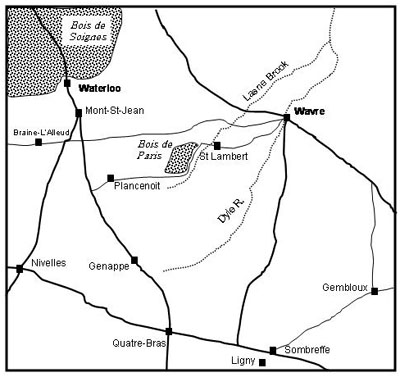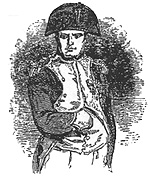 It was nearly 1 p.m. and Marshal Ney sent a request for orders to the Emperor. The grand battery was in place and D'Erlon's corps was ready to attack. Inspecting the Anglo-Allied line through his telescope, Napoleon was about ready to order Ney to begin the bombardment when he heard the buzz from his staff. Looking to his right, toward the low sound of several officers, he saw them pointing off to the northeast. Their muffled voices grew ever louder. "Just a cloud." "No, see the movement. Infantry." "Maybe Grouchy." "Maybe not."
It was nearly 1 p.m. and Marshal Ney sent a request for orders to the Emperor. The grand battery was in place and D'Erlon's corps was ready to attack. Inspecting the Anglo-Allied line through his telescope, Napoleon was about ready to order Ney to begin the bombardment when he heard the buzz from his staff. Looking to his right, toward the low sound of several officers, he saw them pointing off to the northeast. Their muffled voices grew ever louder. "Just a cloud." "No, see the movement. Infantry." "Maybe Grouchy." "Maybe not."
Turning his scope to align with their pointed arms, Napoleon inspected the ridge about four miles distant. A dark patch. Several patches. Some moving. Some not. The tell-tale dust rising from behind the ridge. Napoleon cursed. It wasn't Grouchy. These were Prussians. Grouchy was supposed to keep the Prussians away.
Speedily his nimble, analytical mind churned quicker than a man could speak. "It will be hours before the Prussians get here. Mustn't let them join Wellington. Can't stop now. Need to attack these British and Netherlanders immediately. Destroy them quickly and move on."
"Orders!" snapped the Emperor of the French. "Map!"
Soult and another staff officer approached, the young adjutant opening up a map of the local area, holding it at the right angle and distance for Napoleon to view it effortlessly. Soult stood by, quill in hand, ready to scribble off orders. Napoleon studied the map quickly yet carefully, his eye taking in every detail that his cartographers had sketched out the previous day. Some areas were clearly more detailed than others.
"Tell Lobau to guard the right flank east of Plancenoit. No, tell him to guard every road and path through and around these woods," pointing to the Bois de Paris. "No Prussian is to cross this road," pointing to a line drawn between the woods and Plancenoit. Napoleon saw that he could hardly prevent the Prussians from reinforcing Wellington's left. But he could prevent an attack against his own vulnerable right rear. "And send orders to Grouchy to come here with all his forces." "Now, tell Marshal Ney to begin."
Soult called over several eager couriers who received their orders and sped away. To the officer sent to Lobau, the commander of the Sixth Corps, Soult gave a map marked with Napoleon's orders translated into lines inked in on the paper.
 What If?
What If?
After the Prussians had managed to escape the Ligny battlefield and consolidate in and around the town of Wavre, Blucher made the most important decision of the Waterloo campaign: to send two corps, up to half of his army, to reinforce Wellington if the British would stand and fight. The Prussian Fourth Corps, under General Friederich Wilhelm von Bulow, had not fought at Ligny and was relatively fresh. Although this body of troops was furthest from the British, Blucher nonetheless ordered it to move first. At 4 a.m. on the morning of June 18th, Bulow started his troops toward their British and Dutch Allies. The men slowly moved through the Second Prussian Corps and through the narrow streets of Wavre where a fire broke out. Moving along a single road, the boots of the soldiers and the hooves of their horses churned the roadbed to viscous goo. Struggling slowly forward, the Fourth Corps kept the other three Prussian corps locked in position as Grouchy eventually approached Wavre.
By noon, much of the Fourth Corps was at St. Lambert. Here, however, Bulow apparently forgot his orders. He was to keep his men out of sight but if Wellington and Napoleon had joined battle, Bulow was to attack into the French flank. It was about 3 p.m. when Blucher's badgering finally prompted Bulow to order his brigades forward, through the constricted terrain dominated by the Bois de Paris, and toward Plancenoit and glory.
Marshal Grouchy's lack of energy and muddled judgment contributed to Napoleon's defeat. But the Emperor himself shared much of the blame. What if Napoleon had been quicker to see the threat posed by Blucher and quicker to parry it? This scenario plays with that possibility. In this solo game, I hoped to simulate a situation in which Napoleon reached out to stop Blucher's Prussians from drawing close to Plancenoit and Napoleon's very vulnerable rear area. Instead of meeting Blucher's piecemeal attacks on Plancenoit, I wanted to see if I could prevent the Prussians from ever reaching the main French forces. Could Napoleon perhaps have done this by blocking Blucher as the Prussians worked their way through and around the Bois de Paris?
To do this I would need terrain that represented the low ridges, gentle valleys, small villages, and narrow paths through tracts of forest that marked the route from St. Lambert toward Plancenoit. I would also have to come up with rules to cover fighting along narrow roads through forested terrain. More on that later. First, I took stock of my figures to see what I could muster for this experiment.
Waterloo: The Paris Woods Scenario Part 1
Waterloo: The Paris Woods Scenario Part 2 [LW148]
Back to Table of Contents -- Lone Warrior # 147
Back to Lone Warrior List of Issues
Back to MagWeb Magazine List
© Copyright 2004 by Solo Wargamers Association.
This article appears in MagWeb.com (Magazine Web) on the Internet World Wide Web.
Other articles from military history and related magazines are available at http://www.magweb.com
